By now, we have all heard the word Metaverse. The term became widely used in 2021, when Mark Zuckerberg pledged that Facebook, the gigantic global company that he co-founded, was committed to creating a Metaverse.
Ever since then, companies and individuals across the globe have spoken about bringing a similar focus to the concept of a digital world that co-exists seamlessly with our lived reality.But what does the word actually mean? Where does it come from? What are the Metaverse benefits that have the potential to change all of our lives for the better? And, most intriguing of all, what does the future of the metaverse look like, and how will that impact on the world around us?
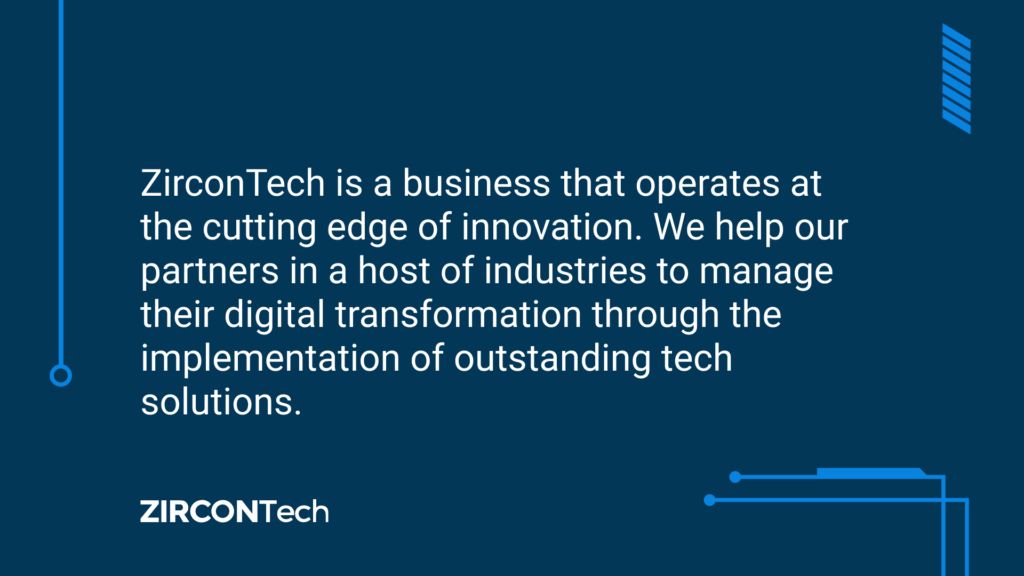
As a result, we have considerable expertise in the Metaverse – so allow us to guide you through the answers to all the questions above.
The meaning of Metaverse
Although the widespread use of the term Metaverse is extremely recent, the Metaverse origins date from well before Zuckerberg’s declaration. The word was actually coined more than three decades ago. Neal Stephenson, in his 1992 science-fiction novel Snow Crash, envisaged a “metaverse”, a space in which humans interacted seamlessly with digital characters in a way that we would recognize as an early depiction of virtual reality.
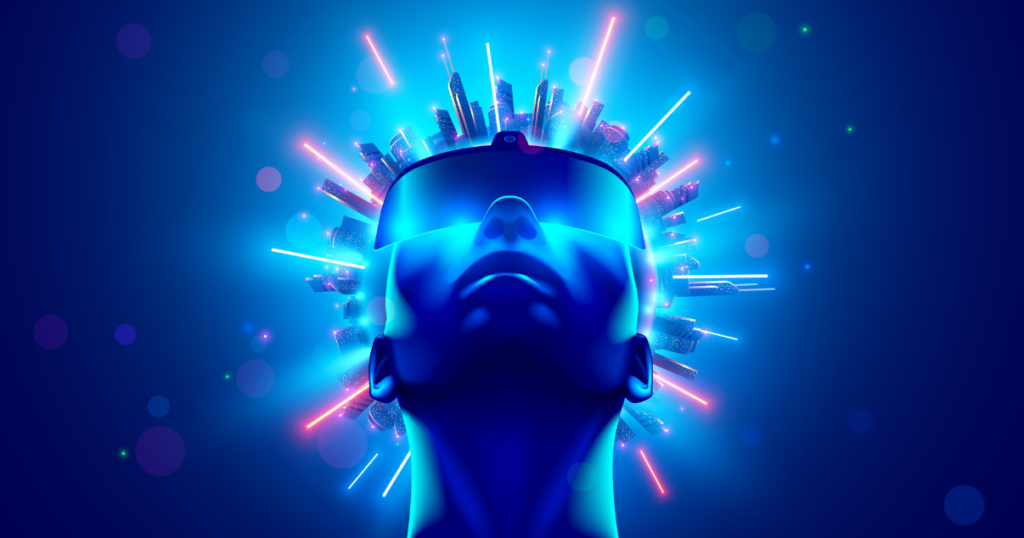
The word itself fuses “meta”, a Greek prefix that means “after” or “beyond” – but can also mean “transcending” or “more comprehensive” – with “universe”. That makes it the perfect label for an entity that exists to blur the boundaries between real life and the virtual world. The fact that it includes a reference to the universe adds to the sense of excitement and limitless potential epitomized by the ceaseless pace of digital innovation in this field today.
The first of the many meta platforms that now exist is usually believed to be Second Life, a virtual world platform that fused social media with a three-dimensional virtual experience. In this context, the meaning of Metaverse is that it is a 3-D internet populated by actual people.Zuckerberg, in the process of declaring Facebook’s commitment to this new multi-layered reality, also renamed his company Meta Platforms. It was, and remains, the clearest statement of intent by a business leader that the organization he directs is fully dedicated to a fully immersive and constantly innovative digital future.
Understanding the Metaverse
So comprehensive has the digital revolution of recent decades been that it is hard to imagine – or remember – a world in which no part of our lives was touched by an online or computerized experience. However, where the meaning of Metaverse really needs to be understood is the new, immersive reality it creates that adds a new dimension to the nature of digital interaction.
Some of the terms that help to define the ever-expanding virtual dimension, and to explain the meaning of Metaverse, are as follows:
Virtual world
Also known as a synthetic world, this is a simulated environment that you can explore – at the same time as many other people – through the use of an avatar. You can interact with this world, and the digital environment responds in a way that makes you perceive that you are in a new immersive reality.
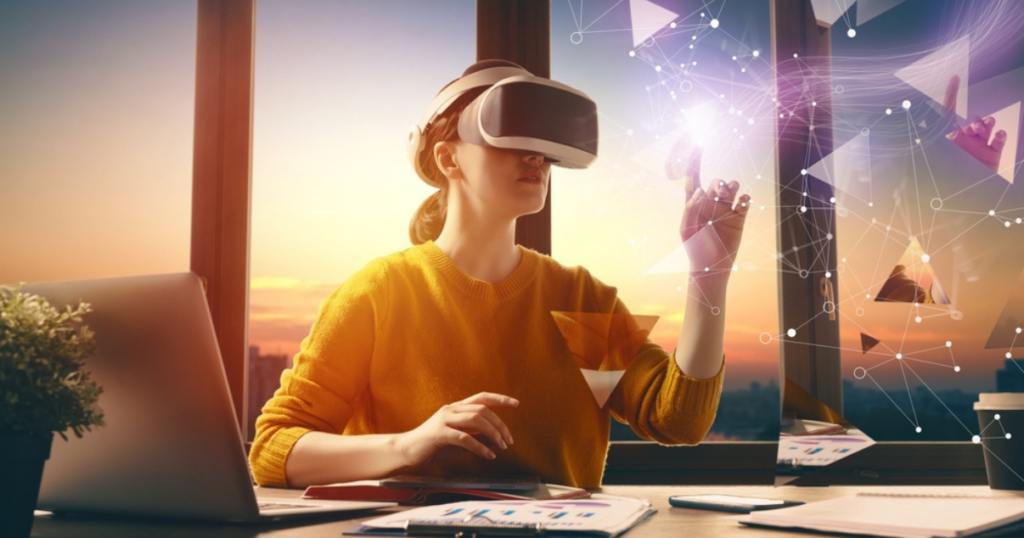
One of the areas in which you might enter a virtual world is through gaming. The most obvious and popular example is Minecraft, which has tens of millions of users.
The cult film series The Matrix provides another excellent example of a situation in which a virtual world is created with which it is possible to interact on an ongoing basis.
Virtual reality
The range of potential uses of VR is extraordinary. By putting on a pair of VR glasses, or a headset, you can enter a host of environments that treat your eyes and ears to amazingly realistic and engaging experiences.
Again, gaming has been at the forefront of VR development, but in the wake of the Covid-19 pandemic it is also being used to bring geographically diverse business teams together.
The ability to interact with other users in a VR space also means there are potential uses in medicine, physical training, and even the military.
Mixed reality
This is an experience that epitomizes the blending of the real world with the digital dimension. In a mixed reality space, you are effectively walking an immersive tightrope between worlds, enjoying an experience that fuses real life with the virtual world.
In this corner of the Metaverse, you might find information in written or graphic form projected on to a virtual background.
One famous example of mixed reality was the projection of Pokemon figures in the real world via a mobile device.
Augmented reality
This is very similar to mixed reality but, as you might expect from the name, it uses digital technology to enhance the physical world.
You might find your senses stimulated by sights, sounds and even smells – imagine how extra-tempting a particular product might be if you could see and smell it in your own home rather than having to journey to the store.
Virtual economies
So far, we have looked at understanding the Metaverse through heightened sensory perception. However, there are also commercial dimensions to the virtual world.
Virtual economies first emerged in massive multiplayer online games, such as Warcraft and Trackmania, where participants could buy and sell virtual goods within the games.
The potential for virtual economies is enormous – many now incorporate crypto currencies and non-fungible tokens. There are even suggestions that organizations such as social media companies might launch their own virtual currencies.
Metaverse benefits
Part of understanding the meaning of Metaverse is an appreciation of the positive difference that this new fusion of the real world and virtual reality can make to our lives in a host of different ways. Some of the Metaverse benefits – both existing and potential – are as follows.
Cutting down distances
Once you enter the Metaverse, it doesn’t matter where in the world you actually are. It is possible to hold business meetings with colleagues in different cities and continents without having to travel vast distances – or, indeed, any distance at all. You can also play games against opponents who may be thousands of miles away.
Total immersion
The quality of the technology that underpins the Metaverse means the experience within it will be a compelling, exciting and immersive one. Once you put on a virtual reality headset, for instance, you are transported to a completely different space, one that stimulates all your senses. It is possible to feel you are in a totally new arena, either in a business or personal context.
Social interaction
The lockdowns imposed in response to the Covid-19 pandemic reinforced vividly the importance of human interaction. One of the most attractive Metaverse benefits is the ability to socialize with your friends. You can potentially immerse yourself in that party you thought you would not be able to attend.
Social media
Given that Facebook – now known as Meta – is at the forefront of this phenomenon, we should expect greatly enhanced interactive and immersive opportunities through our favorite meta platforms. Three-dimensional virtual experiences should become the norm in the very near future.
Commercial opportunities
Numerous companies and organizations have embraced the potential of e-commerce, and now bring their products to market through the digital space. However, the full potential of the Metaverse represents a huge leap forward. Potential customers can enjoy an amazingly enhanced exposure to potential purchases, with the ability to see and even virtually touch the things you are trying to sell them.
Education
Imagine being able to walk with dinosaurs, or visit an historic battlefield while the fighting is still going on. The virtual world holds out the prospect of today’s youth being able to study in a far more immersive and informative way through the creation of such experiences. That also means the ability to bring alive concepts and ideas in a way that makes them easier to access and understand.
Crypto and NFTs
Cryptocurrency fits seamlessly into the virtual world of the Metaverse. The decentralized nature of crypto makes it ideal for the borderless virtual experiences this new dimension delivers. The fact that non-fungible tokens are an effective bridge between the real world and the digital realm also means that NFTs will assume greater importance in making the Metaverse real.
Gaming
Game playing has, as we have seen, always been at the cutting edge of the development of virtual reality in particular and the Metaverse in general. That trend is set to continue, as game developers invest billions of dollars into the drive to create products that have VR and AR at their core – and an enhanced experience for the gamers who use them.
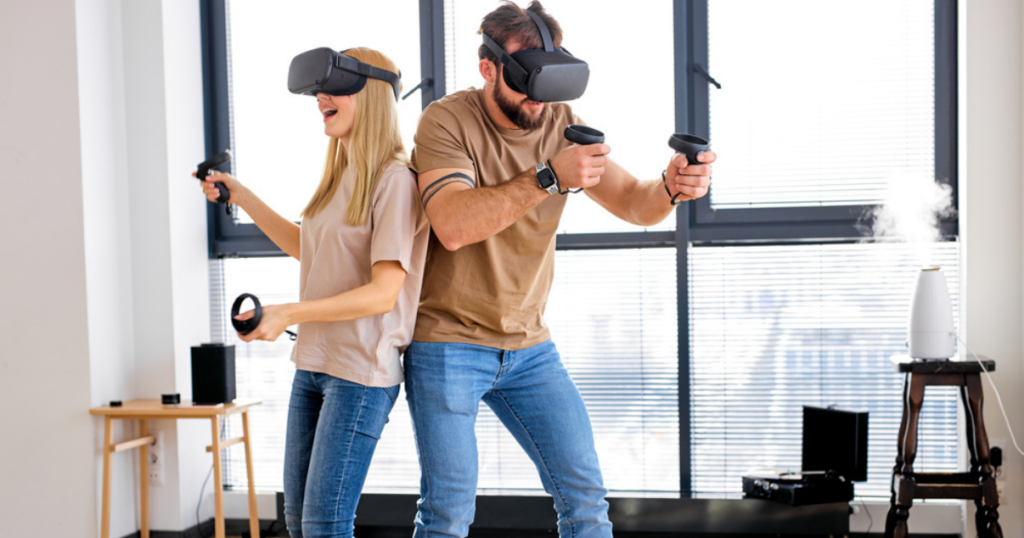
Healthcare
The need to visit your doctor, or even hospital, with a health issue may become less acute depending on your condition. Many problems can be cleared up by a virtual consultation that is made far more immersive and constructive through the use of 3-D tech than a simple video call.
Despite the persuasive nature of many of the Metaverse benefits listed here, it has to be acknowledged, as part of understanding the Metaverse, that there are potential pitfalls lurking too.
Organizations need to be aware of the risk of cybercrime in a fledgling environment, for instance. There could also be a negative impact on society as people choose to live remotely rather than socialize in person, and spend their time in the virtual world rather than the real one.
All of us who are rushing to embrace the Metaverse must be mindful of its potential to exacerbate mental health issues, not least through virtual bullying and addiction to immersive gaming experiences.
The future of the Metaverse
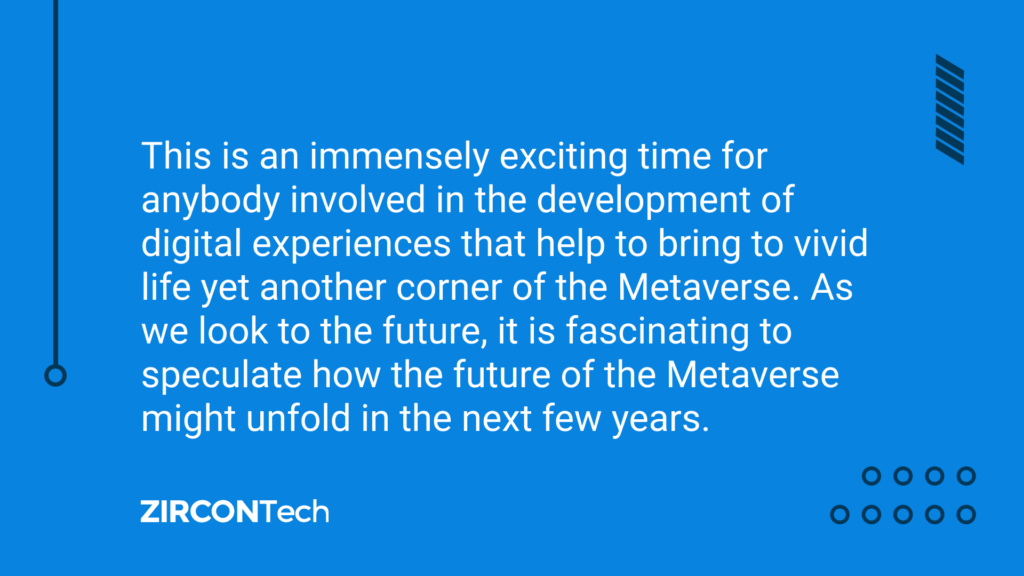
Studies suggest there are four factors that will determine the nature of the future evolution of the Metaverse. They are:
- Standardization: This refers to the extent to which different platforms will come together to ensure a high level of interoperability. Will you be able to take the same digital identity across meta platforms, for instance?
- Market fragmentation: It will be intriguing to see if several market leaders emerge, and what different sectors they serve. This consideration is closely linked to standardization.
- User interface: How completely will people around the planet assimilate the virtual world into their daily lives? The answer to this question is absolutely fundamental to the extent to which the Metaverse is adopted on a wide scale.
- Governance: Local and national authorities may play a part in the administration of the virtual world. Alternatively, meta platforms may govern themselves and, ideally, provide the levels of security and reassurance that users will need.
A consideration of those factors leads, in turn, to the sense that there are three potential scenarios with regard to the future of the Metaverse and how it might appear by the end of this decade.
- The Metaverse becomes the environment of choice for certain specific use cases that complement other technologies. However, it never becomes a general-purpose platform.
- Although there is not a single Metaverse, there are several major players among the next generation of tech leaders who all participate across a dynamic market place.
- The complete migration of the internet as we know it today, as well as numerous developing technologies, into an open Metaverse that is the main interface through which people live their daily lives.
Whichever of those scenarios comes to pass by 2030, there is no doubt whatsoever that the way we interact with digital technology will be an incredibly important issue for companies and individuals in the intervening years.
What is the meaning of Metaverse? As with any universal concept, it is not easy to sum up in a single phrase. But it will increasingly be the definition of the digital world, and the way we work within it.
ZirconTech, with its exceptional experience in the digital sphere, is the ideal partner for any organization looking to drive a digital transformation. We will be delighted to listen to your needs and concerns – and to dispel your doubts and deliver a solution that works for you.